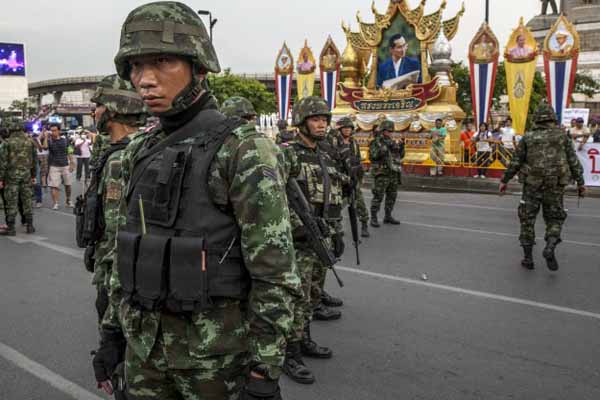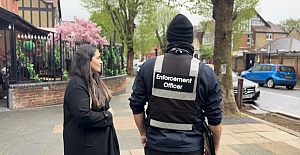The bitter conflict, rooted in historical distrust between Malay Muslims and Thai Buddhists, has killed over 6,000 people and injured around 10,800 since January 2004. National Security Council Secretary-General Thawil Pliensri declared over the weekend that the talks with southern rebels would reconvene before the end of this month, in agreement with the junta. The dialogue was initially started in March 2013 by then Prime Minister Yingluck Shinawatra’s civilian government, but was suspended last December as massive anti-government protests paralyzed the capital. Since the May 22 coup, the junta has installed a series of reforms aimed at bringing together the two quarrelling factions - Red Shirts (opponents of the military and bureaucratic establishment) and Yellow Shirts (ardent royalists opposed to the governments of Yingluck and elder brother former Prime Minister Thaksin Shinawatra) protesters - before new elections are held in October next year. It now appears to be turning its attentions to the south. Although southern Thailand's armed-insurgent groups are still to formally respond, analysts talking to the Anadolu Agency doubt the new dialogue's ability to bear fruit under present conditions.
“I am not optimistic. It is, of course encouraging, that the military talk about the perspective of peace through a dialogue, but it is not apparent yet what kind of concessions they are ready to make,” Matthew Wheeler, an International Crisis Group (ICG) expert on the southern conflict, told AA.
The deep south - the provinces of Pattani, Yala and Narathiwat as well as a part of Songkla province - was an independent sultanate until the 19th century and was only formally annexed by Buddhist-majority Siam (Thailand's previous name) under the terms of a 1909 Anglo Siamese agreement. Eighty percent of the population, however, remains Muslim, maintaining Malay as its first language.
The insurgents argued during the previous nine-month dialogue that with such a strong historical claim and the area’s continuing Muslim identity, political autonomy should be a key element of any potential settlement.
But the junta has clearly indicated that any such movement would be considered an unacceptable violation of the “territorial integrity” of the country.
Rungrawee Chalermsripinyorat, an independent analyst who has been studying the southern issue for over ten years, underlined the importance of autonomy to the insurgents.
“Political autonomy is the main issue. Otherwise, there is nothing to talk about,” she said.
To complicate matters, the insurgents are not a homogeneous movement, but a collection of different groups, sometimes subdivided into different factions.
The lead representative during the 2013 peace dialogue was a leader of the National Revolution Front (BRN) - which appears to exert a certain degree of control on armed operatives on the ground – however “some hardliners are not willing to join the talks,” said Chalermsripinyorat.
BRN is one of several groups that emerged in the 1960s in reaction to attempts by the military dictatorship of the time to control Islamic schools. Another group of that period is the Patani United Liberation Organization (PULO), which was also involved in last year's peace talks. A third active group is the Barisan Islam Pembebasan Patani (BIPP), but it did not participate in the talks.
Further complicating matters is that some combatants have been moonlighting for criminals, explosions often closer associated to criminality than insurgency.
ICG south expert Wheeler told AA that the reluctance of some groups to participate could deepen given the attitude of the junta in the south since the coup. The military has marginalized what little influence government-linked civilian organizations had in the area.
“The National Council for Peace and Order [the Junta's official name] is leaning towards greater centralization. It doesn’t appear to me as a progressive step,” he said.
The junta's obsession with national unity is also leading to a rejection of any external involvement in efforts to find a peaceful solution.
Malaysia had been asked to act as a facilitator in the 2013 talks by the Thai civilian government, despite objections from the Thai military. Diplomats have also been waging a long campaign to stop the Organization of the Islamic Cooperation (OIC) - in which Thailand enjoys observer capacity - from speaking out on the issue.
“Basically, the military have been following the same method for the last ten years, coupling suppression and pacification. And this approach has not been successful,” said Chalermsripinyorat.
“They cannot think out of the box. They have to learn from the experiences of other countries - such as Aceh, in Indonesia, or the southern Philippines - and see that autonomy is not [always] the first step to independence.”
In Indonesia's northern Sumatra region of Aceh, a separatist armed Free Aceh Movement (GAM) settled for autonomy in 2005 after negotiations with Jakarta. In the southern Philippines, the Moro Islamic Liberation Front was granted in 2014 an autonomous zone by Manila after negotiations facilitated by Malaysia.


 Prime Minister Keir Starmer's 2025 Easter message
Prime Minister Keir Starmer's 2025 Easter message After Nesil Caliskan a by-election will be held in Jubilee ward in Enfield
After Nesil Caliskan a by-election will be held in Jubilee ward in Enfield Publishing the analysis, Labour’s Cllr Ergin Erbil said Everybody in Enfield deserves basic rights
Publishing the analysis, Labour’s Cllr Ergin Erbil said Everybody in Enfield deserves basic rights Gaza-Israel conflict Statement from Cllr Ergin Erbil, Leader of Enfield Council
Gaza-Israel conflict Statement from Cllr Ergin Erbil, Leader of Enfield Council UK AMBASSADOR TO TURKEY VISITS FETHIYE
UK AMBASSADOR TO TURKEY VISITS FETHIYE Journalists from Europe held the Turkish Media Workshop in Skopje
Journalists from Europe held the Turkish Media Workshop in Skopje The European Union called on Turkey to uphold democratic values
The European Union called on Turkey to uphold democratic values Turkish citizens in London said Rights, Law, Justice
Turkish citizens in London said Rights, Law, Justice The 'Prince of Paris' has impressed in his first EuroLeague season
The 'Prince of Paris' has impressed in his first EuroLeague season Saran Media And Euroleague Basketball Extend Media Rights Partnership for Four More Years
Saran Media And Euroleague Basketball Extend Media Rights Partnership for Four More Years Will Rangers be Jose Mourinho’s next victim?
Will Rangers be Jose Mourinho’s next victim? Jose Mourinho's Fenerbahce face Rangers on Thursday
Jose Mourinho's Fenerbahce face Rangers on Thursday Residents welcomed back to Edmonton Leisure Centre
Residents welcomed back to Edmonton Leisure Centre Barclays has become the biggest UK lender so far to cut mortgage rates
Barclays has become the biggest UK lender so far to cut mortgage rates THE SPRING STATEMENT EXPLAINED, UK ECONOMIC OUTLOOK AND GROWTH FORECASTS
THE SPRING STATEMENT EXPLAINED, UK ECONOMIC OUTLOOK AND GROWTH FORECASTS Launch of Made in Enfield gift shop to celebrate local artists and designers
Launch of Made in Enfield gift shop to celebrate local artists and designers


















